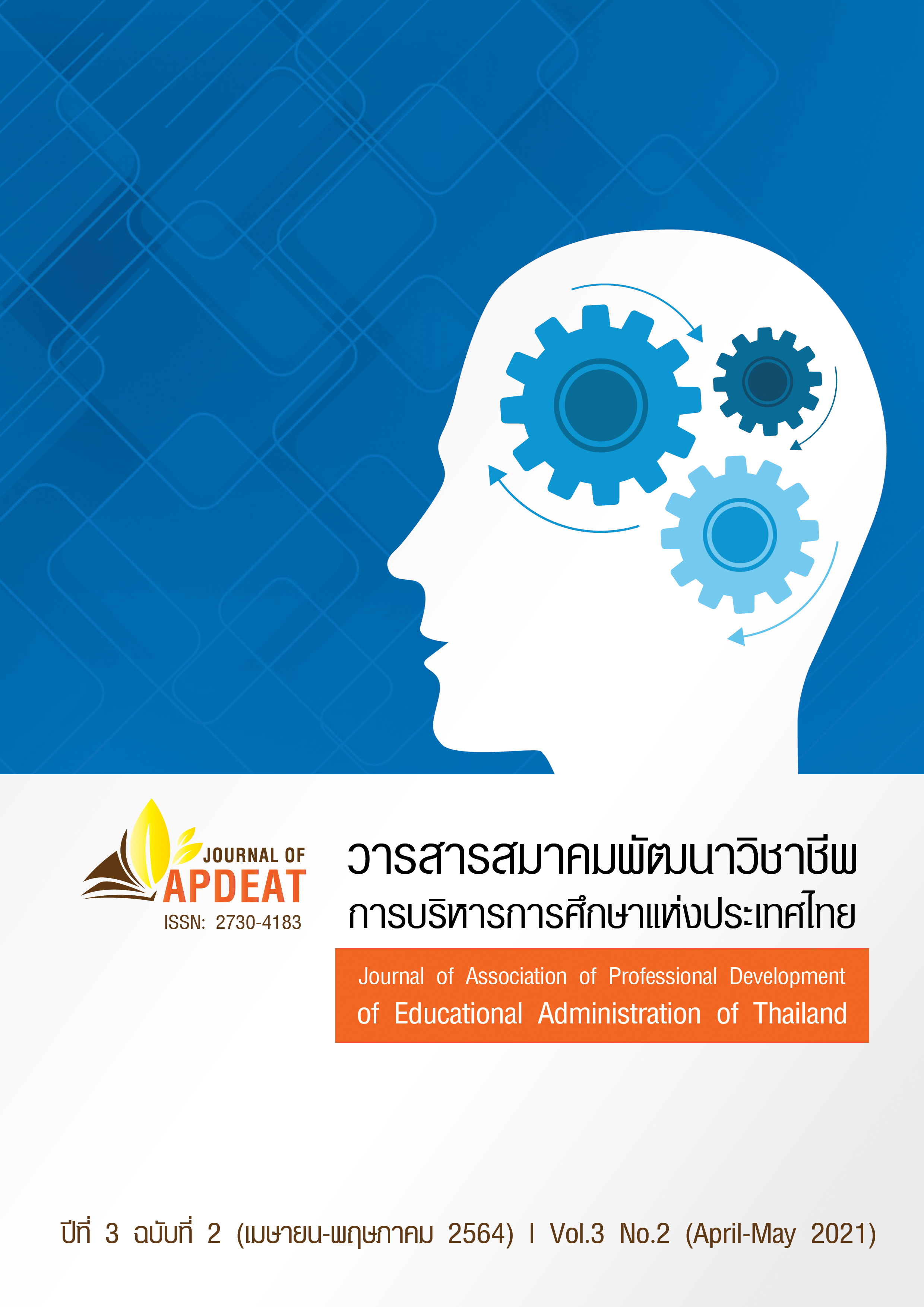The The 21st Century Supervisors in Educational Supervision Competencies Under The Chiang Mai Primary Education Service Area Office 1-6
Main Article Content
Abstract
The objective of this research was to study the educational supervision competencies of supervisors in the 21st. Century under Chiang Mai Primary Education Service Area Office 1-6. It was a mixed methods between quantitative and qualitative research. Research instruments were a questionnaire with calculating by Item-Objective Congruence (IOC) = 0.80 and an in-depth interview form. The sample group selected by simple random sampling consisted of 608 school administrators, teachers, and experts /qualifications in educational supervision.
The results show that:
- The educational supervision competency of supervisors in the 21st. Century under Chiang Mai Primary Education Service Area Office 1-6 consisted of 3 important educational supervision competencies as follows: 1) competency of capable skills (Desired conditions X ̅ = 4.53, S.D. = 0.65; Current conditions X ̅ ̅ = 3.72, S.D. = 0.80, PNI = 0.22); 2) competency of knowledge (Desired conditions X ̅ = 4.52, S.D. = 0.67; Current conditions X ̅ = 3.81, S.D. = 0.80, PNI = 0.19) and 3) competency of supervisors’ characteristics. (Desired conditions X ̅ = 4.63, S.D. = 0.58; Current conditions X ̅ = 4.05, S.D. = 0.77, PNI = 0.15).
- Results of an in-depth interview were as follows: these mentioned competencies was the body of knowledge leading to be the transformational leadership in the digital era of supervisors in the 21st. Century. Moreover, it was essential to build a collaborative network through information technology media that helped supervisors and supervisees exchange knowledge to cooperate in developing the professional supervision in order to conduct the sustainability.
Article Details
How to Cite
ขอดศิริ ช., พยัคฆ์กุล ด., & Kruekamai, W. (2022). The The 21st Century Supervisors in Educational Supervision Competencies Under The Chiang Mai Primary Education Service Area Office 1-6. Journal of Association of Professional Development of Educational Administration of Thailand (JAPDEAT), 3(2), 21–28. retrieved from https://so04.tci-thaijo.org/index.php/JAPDEAT/article/view/254530
Section
Research Articles
References
กรองทอง จิรเดชากุล. (2550). คู่มือการนิเทศภายในโรงเรียน. กรุงเทพฯ: ธารอักษร
กระทรวงศึกษาธิการ. (2552). นโยบาย 4 ใหม่ของกระทรวงศึกษาธิการ. (ออนไลน์) (อ้างเมื่อ 18 สิงหาคม
2552). http://www.mua.go.th/users/bpp/developplan/download/news/4new.htm
ชาลี มณีศรี. (2542). การนิเทศการศึกษา. กรุงเทพฯ: ศิลปาบรรณาคาร
นภาเดช บุญเชิดชู. (2552). การพัฒนารูปแบบการพัฒนาสมรรถนะของผู้บริหารโรงเรียน ตามมาตรฐาน
วิชาชีพทางการศึกษา. วิทยานิพนธ์ปริญญาครุศาสตรดุษฎีบัณฑิต สาขาวิชาบริหารการศึกษา
คณะครุศาสตร์ จุฬาลงกรณ์มหาวิทยาลัย
มาเรียม นิลพันธุ์. (2554). การประเมินโครงการยกระดับคุณภาพครูทั้งระบบ กิจกรรมการพัฒนานิเทศ
แนวใหม่. วารสารมหาวิทยาลัยศิลปากร ฉบับภาษาไทย. 31(2), 149-166
มูลนิธิสถาบันวิจัยเพื่อพัฒนาประเทศไทย TDRI. (2556). การจัดทำยุทธศาสตร์การปฏิรูปการศึกษา
ขั้นพื้นฐานให้เกิดความรับผิดชอบ. (ออนไลน์) (อ้างเมื่อ 5 ธันวาคม 2556).
https://tdri.or.th/2014/05/std_2014_05_22/
วิจารณ์ พานิช. (2555). วิถีสร้างการเรียนรู้เพื่อศิษย์ในศตวรรษที่ 21. กรุงเทพฯ: ตถาตา พับลิเคชั่น จำกัด
วชิรา เครือคำอ้าย และชวลิต ขอดศิริ. (2561). การพัฒนารูปแบบการนิเทศโดยใช้กระบวนการชี้แนะและ
ระบบพี่เลี้ยง เพื่อส่งเสริมศักยภาพการจัดการเรียนรู้ในศตวรรษที่ 21 สังกัดสำนักงาน
คณะกรรมการการศึกษาขั้นพื้นฐาน จังหวัดเชียงใหม่. เชียงใหม่ : มหาวิทยาลัยราชภัฏเชียงใหม่
สุกัญญา รัศมีธรรมโชติ. (2550). การจัดการทรัพยากรมนุษย์ด้วย Competency – Based HRM.
กรุงเทพฯ: สถาบันเพิ่มผลผลิตแห่งชาติ
อาภรณ์ ภู่วิทยพันธุ์. (2551). กลยุทธ์การพัฒนาทรัพยากรมนุษย์. กรุงเทพฯ: เอช อาร์ เซ็นเตอร์
Boyatzis, R. E. (1982). The Competency Manager: A Model for Effective Performance.
New York: John Wiley and sons
Krejcie, R. V. & Morgan, D. W. (1970). Determining Sample Size for Research Activities.
Educational and Psychological Measurement, 30(3), 607-610.
McClelland, D. C. (1973). Testing for competence rather than for intelligence. American
Psychologist, 28(1), 1–14. https://doi.org/10.1037/h0034092
Spencer, SL. M. and Spencer, S. M. (1993). Competency at work: Models for superior
performance. New York: John Wiley and sons
กระทรวงศึกษาธิการ. (2552). นโยบาย 4 ใหม่ของกระทรวงศึกษาธิการ. (ออนไลน์) (อ้างเมื่อ 18 สิงหาคม
2552). http://www.mua.go.th/users/bpp/developplan/download/news/4new.htm
ชาลี มณีศรี. (2542). การนิเทศการศึกษา. กรุงเทพฯ: ศิลปาบรรณาคาร
นภาเดช บุญเชิดชู. (2552). การพัฒนารูปแบบการพัฒนาสมรรถนะของผู้บริหารโรงเรียน ตามมาตรฐาน
วิชาชีพทางการศึกษา. วิทยานิพนธ์ปริญญาครุศาสตรดุษฎีบัณฑิต สาขาวิชาบริหารการศึกษา
คณะครุศาสตร์ จุฬาลงกรณ์มหาวิทยาลัย
มาเรียม นิลพันธุ์. (2554). การประเมินโครงการยกระดับคุณภาพครูทั้งระบบ กิจกรรมการพัฒนานิเทศ
แนวใหม่. วารสารมหาวิทยาลัยศิลปากร ฉบับภาษาไทย. 31(2), 149-166
มูลนิธิสถาบันวิจัยเพื่อพัฒนาประเทศไทย TDRI. (2556). การจัดทำยุทธศาสตร์การปฏิรูปการศึกษา
ขั้นพื้นฐานให้เกิดความรับผิดชอบ. (ออนไลน์) (อ้างเมื่อ 5 ธันวาคม 2556).
https://tdri.or.th/2014/05/std_2014_05_22/
วิจารณ์ พานิช. (2555). วิถีสร้างการเรียนรู้เพื่อศิษย์ในศตวรรษที่ 21. กรุงเทพฯ: ตถาตา พับลิเคชั่น จำกัด
วชิรา เครือคำอ้าย และชวลิต ขอดศิริ. (2561). การพัฒนารูปแบบการนิเทศโดยใช้กระบวนการชี้แนะและ
ระบบพี่เลี้ยง เพื่อส่งเสริมศักยภาพการจัดการเรียนรู้ในศตวรรษที่ 21 สังกัดสำนักงาน
คณะกรรมการการศึกษาขั้นพื้นฐาน จังหวัดเชียงใหม่. เชียงใหม่ : มหาวิทยาลัยราชภัฏเชียงใหม่
สุกัญญา รัศมีธรรมโชติ. (2550). การจัดการทรัพยากรมนุษย์ด้วย Competency – Based HRM.
กรุงเทพฯ: สถาบันเพิ่มผลผลิตแห่งชาติ
อาภรณ์ ภู่วิทยพันธุ์. (2551). กลยุทธ์การพัฒนาทรัพยากรมนุษย์. กรุงเทพฯ: เอช อาร์ เซ็นเตอร์
Boyatzis, R. E. (1982). The Competency Manager: A Model for Effective Performance.
New York: John Wiley and sons
Krejcie, R. V. & Morgan, D. W. (1970). Determining Sample Size for Research Activities.
Educational and Psychological Measurement, 30(3), 607-610.
McClelland, D. C. (1973). Testing for competence rather than for intelligence. American
Psychologist, 28(1), 1–14. https://doi.org/10.1037/h0034092
Spencer, SL. M. and Spencer, S. M. (1993). Competency at work: Models for superior
performance. New York: John Wiley and sons


